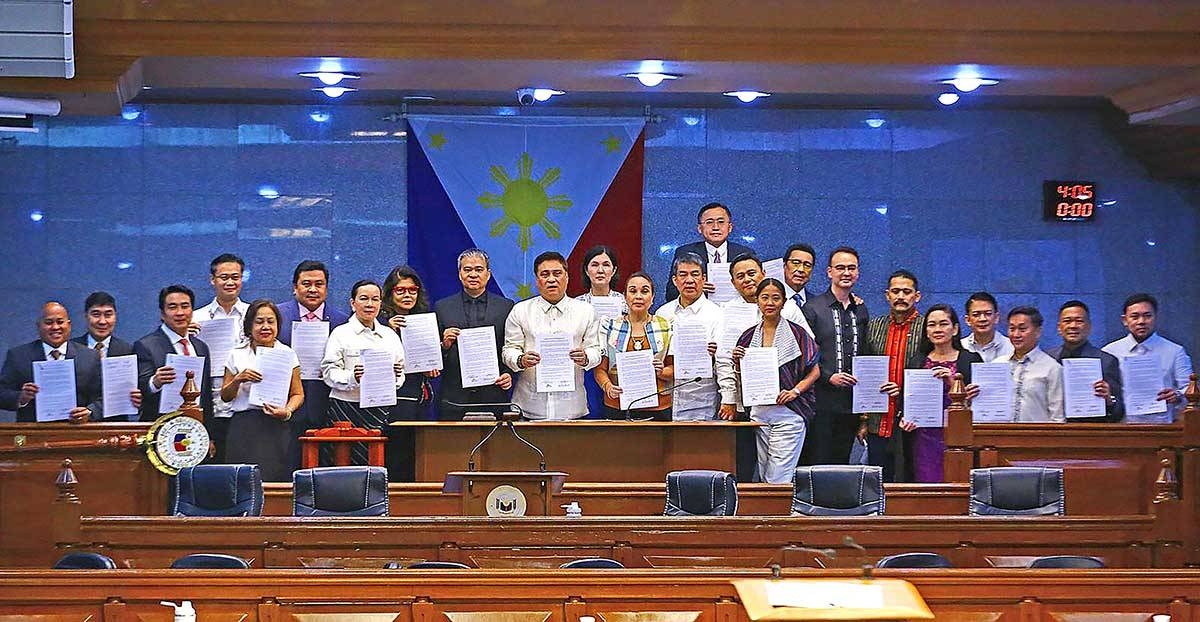MANILA, Philippines: The Resolution of Both Houses (RBH) 6, which aims to amend the economic provisions of the 1987 Constitution, has hit a roadblock in the Senate before it could gain momentum.
This setback follows the withdrawal of support from several senators who expressed their reservations about the proposed measure. Senate Majority Leader Emmanuel “Joel” Villanueva, in a statement to the media on Tuesday, revealed that senators were disheartened by reports suggesting that the leadership of the House of Representatives was spearheading a people’s initiative on Constitutional amendments.
Responding to President Ferdinand “Bongbong” Marcos Jr.’s call to lead discussions on amending the economic provisions of the 1987 Constitution, Senate President Juan Miguel “Migz” Zubiri filed RBH 6 on Monday. The President had proposed during a meeting with Zubiri and Speaker Martin Romualdez last week that the Senate pass the measure, which would then be adopted by the House.
However, President Marcos cautioned against the people’s initiative, deeming it “too divisive.” Reports of bribery, threats, and disinformation surrounding the collection of signatures further fueled concerns about the proposed method.
RBH 6, as outlined by Zubiri, includes amendments to Section 11 of Article XII, which pertains to National Patrimony and Economy; Paragraph 2, Section 4 of Article XIV, which covers Education, Science and Technology, Arts, Culture, and Sports; and Paragraph 2, Section 11 of Article XVI, which addresses General Provisions. Additionally, the resolution aims to “constitutionalize” the Public Services Act, which is currently being challenged in the Supreme Court.
Zubiri had initially planned for discussions on the proposed amendments to commence this month and conclude by March of this year. However, the withdrawal of support from fellow senators has cast doubt on the timeline for these deliberations.
The proposed amendments to the 1987 Constitution have generated significant debate and controversy within the Philippine political landscape. Proponents argue that these changes are necessary to attract foreign investments and promote economic growth. They believe that relaxing certain restrictions on foreign ownership will encourage more capital inflows and create job opportunities for Filipinos.
On the other hand, critics express concerns about potential risks associated with amending the Constitution, particularly in relation to national sovereignty and the protection of local industries. They argue that existing economic provisions serve as safeguards against exploitation and undue foreign influence.
The opposition within the Senate reflects the diversity of perspectives on this issue. It highlights the importance of thorough deliberations and careful consideration of the potential implications of any constitutional amendments. The Senate, as the upper chamber of the Philippine Congress, plays a vital role in ensuring that any changes made to the Constitution serve the best interests of the Filipino people.
As the discussions on RBH 6 continue, it is crucial for lawmakers to engage in open and transparent dialogue, taking into account the concerns and aspirations of the Filipino public. The fate of these proposed amendments will shape the future of the Philippine economy and society, making it essential to strike a balance between attracting foreign investments and protecting national interests.
In conclusion, the proposed amendments to the 1987 Constitution face significant opposition in the Senate. The withdrawal of support from senators and concerns about the people’s initiative have stalled the progress of the Resolution of Both Houses (RBH) 6. As the debates continue, it is essential for lawmakers to consider the diverse perspectives and interests of the Filipino people. The outcome of these discussions will have far-reaching implications for the country’s economic future and national sovereignty.







